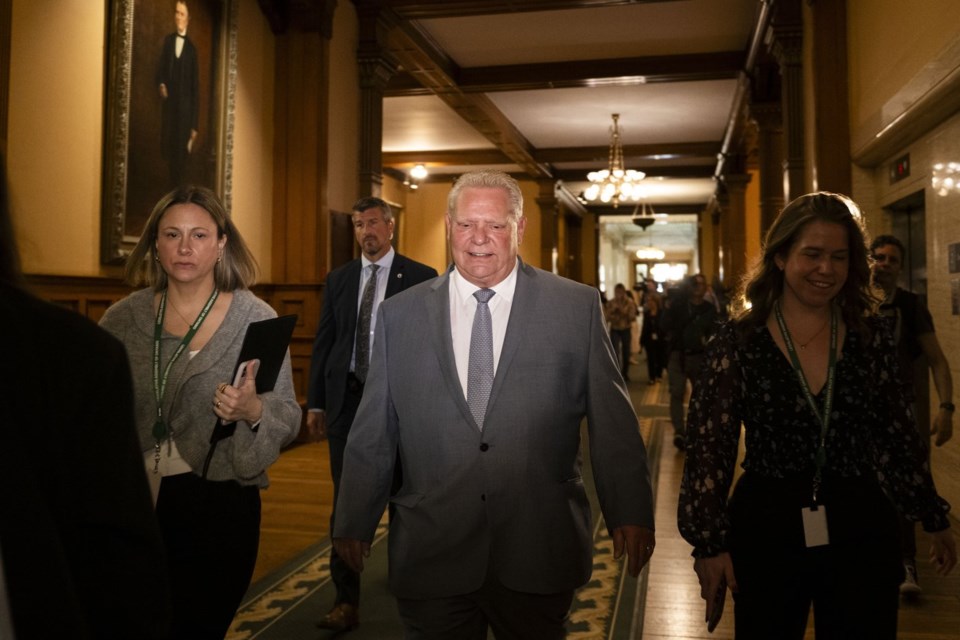TORONTO — Ontario's major political parties have been spending the summer nominating candidates, running "campaign schools," and canvassing after remarks from the premier this spring fuelled speculation he will call an early election.
The province's next fixed election date isn't until June 2026, but Doug Ford set off alarm bells in political circles this past May when he repeatedly refused to commit to that timeline during a news conference, saying only that he wants to make sure he fulfils his agenda and keeps the promises his majority Progressive Conservative government has made.
Liberal co-campaign directors Genevieve Tomney and Chad Walsh – officially named to their positions soon – looked at each other and said, "now it's time to go," Tomney said in an interview.
"We've kind of been treating this as a campaign summer," she said.
"What I would say about campaigns is that I sometimes kind of compare it to an iceberg, where so much of the work that's being done is happening below the surface, but we're gearing up for a pretty big end of summer into the fall."
Some of that below-the-surface work entails putting calls out to potential campaign staff and volunteers. Gone are the majority Liberal government days when the party had a campaign army at the ready – most of them have moved into different roles and into the private sector.
"Pulling all of those people back together again is kind of like a huge volunteer-slash-HR effort as well," Tomney said.
Some of the public-facing election preparations include nominating candidates. The Liberals are starting by nominating their incumbents, but that will only fill nine out of 124 ridings, so the task ahead is daunting.
It's unclear how much time they will have – elections tend to happen in the fall or spring, and Tomney said the Liberals are focusing on three main scenarios: fall 2024, spring 2025 and the as-scheduled spring 2026.
Ford told Ottawa radio station CFRA that Ontario would "100 per cent" not have an election this summer or fall.
But parties like the NDP are not banking on that.
"We're going to prepare as such," Leader Marit Stiles said in an interview. "If it's not this fall and it's, say, next spring we will be just even more ready."
Laryssa Waler, a former director of communications for Ford and founder of Walman Strategies, said a spring 2025 election seems more likely than the fall.
"You saw how the last election got called, there was essentially a referendum on the budget that they presented and they won more seats," she said in an interview. "So I wouldn't be surprised if they did something similar, because it worked so well last time."
The NDP was starting some early election campaign planning this year, but Ford's comments "kicked it up a notch," Stiles said. Summers are always a good time for members of provincial parliament to connect with their constituents, and this year the politicians and volunteers are out knocking on doors, Stiles said.
"Our MPPs are on the road and some of them have been out across the province and will continue to be to help engage with our activists, connect with potential voters, help us to identify candidates, which of course is a big push right now.
"In a lot of ridings, where we don't have incumbents and we don't even have a candidate yet (organizers) are canvassing this summer. They're trying to cover as much of the riding as they can. Many of them are trying to get through the entire riding ... before the fall."
The NDP are also running campaign schools this summer to help teach people in local riding associations how to run campaigns, so the party is ready on the ground locally, not just centrally, Stiles said.
Both opposition parties are also working on some ads to help introduce their leaders to voters, since it will be the first provincial general election each of them fight.
The Green Party of Ontario, which now has two seats in the legislature, has also been busy over the past couple of months.
"We’ve spent the summer assembling localized mobilizing teams and boosting our ground game capacity in target ridings across the province, with our leader and deputy leaders participating in regular riding canvasses," executive director Jaymini Bhikha wrote in a statement.
"We are also preparing to open nominations in the very near future."
The Progressive Conservatives currently hold 78 seats, so they have a significant advantage when it comes to getting 124 candidates in place for an election. The party is also ahead in polling and is raising more money than the others, Waler said, which are big factors in considering election readiness. As well, they are constantly polling and conducting research, she said.
Tory caucus members have been out door knocking too this summer, but Ford encourages them to do so year-round, no matter the time in the election cycle, Waler said.
"If you do that, the benefit is you're more election ready, but the practicality is, you know what your constituents think year round," she said.
"I think that (the party) took a lot of lessons from the time they spent not in government, of things that they're going to always make sure they do, and that is data and fundraising. They're not going to ever be caught ill-prepared again."
This report by The Canadian Press was first published Aug. 21, 2024.
Allison Jones, The Canadian Press



